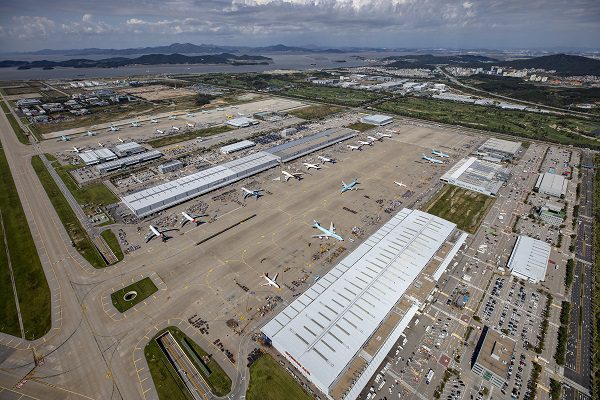 Under the leadership of the newly appointed President Lee Hak-Jae, Incheon International Airport is setting forth on a renewed path, crafting various strategies to encourage collaborative growth with business partners including logistics companies and airlines.
Under the leadership of the newly appointed President Lee Hak-Jae, Incheon International Airport is setting forth on a renewed path, crafting various strategies to encourage collaborative growth with business partners including logistics companies and airlines.
Enhancing Customer Convenience through Advanced Infrastructure
Currently, the Incheon International Airport Free Trade Zone includes an airport logistics complex and cargo terminal areas, offering a competitive environment to clients through efficient customs procedures, duty-free benefits, and a range of incentives.
Companies situated in this zone enjoy the freedom to conduct manufacturing, logistics, and trade activities without hindrance, alongside perks such as reduced rental fees and deferred customs duties.
Currently, the freight terminal houses eight cargo buildings, three air freight warehouses, four specialized processing facilities, and two customs bonded areas, establishing a solid foundation for a logistics hub.
Furthermore, Incheon International Airport is actively involved in the development of a modern cargo terminal and is pioneering autonomous cargo towing technology to enhance its operational efficiency and sophistication. This initiative is expected to significantly upgrade the logistics services available to customers.
Moreover, the airport administration is focusing on expanding transportation options to facilitate customer convenience. Plans are underway to add new transportation methods, including additional bus services, to ensure easier access to the logistics complex.
Expanding Collaborative Marketing with Clients
Incheon International Airport is also investing effort in amplifying the marketing activities of its client companies. Recently, the airport partnered with Jeju Air to host a ‘Joint Information Session to Boost Air Cargo Volume in the Vietnam Region’. The two-day event, held from May 31 to June 1 in Hanoi and Ho Chi Minh City, Vietnam, targeted logistics stakeholders in the region.
As a vital component of the airport’s ongoing ‘Air Cargo Incentive Program’ aimed at increasing air cargo volume, this initiative successfully attracted approximately 150 representatives from 61 Vietnamese forwarding and logistics firms, receiving an overwhelmingly positive response.
Looking ahead, Incheon International Airport plans to hold joint information sessions with FedEx later this year and initiate online marketing campaigns in collaboration with China Airlines and UPS. Through continuous discussions, the airport plans to broaden its collaborative marketing efforts with an increasing number of clients in the near future.
Customized Support for Stimulating Growth in New Cargo Sectors
Incheon International Airport is actively striving to enhance cargo volume, with a primary focus on extending substantial support to emerging growth sectors in the cargo industry, aiming to significantly increase the overall throughput.
Recently, Incheon International Airport achieved a world-first by obtaining CEIV certification in three key growth areas: perishable goods, pharmaceuticals, and lithium batteries. This achievement underscores the airport’s commitment to engaging with companies in these fields, understanding customer requirements and offering tailored support.
In the perishable goods sector, the airport is actively collaborating with organizations such as the Korea Agro-Fisheries & Food Trade Corporation (aT) and the Korea Trade-Investment Promotion Agency (KOTRA). Simultaneously, in the pharmaceutical sector, it is in discussions with leading companies such as Celltrion and Samsung Biologics to optimize logistics and transportation processes. Plans are also in the works to initiate a collaboration with the Korea Biomedicine Industry Association (KoBIA).
Collaborating with Leading Global Logistics Companies
To foster mutual growth with its clients, Incheon International Airport is enhancing its infrastructure in collaboration with prominent global logistics firms.
The airport has established a partnership with FedEx, a foremost company in air cargo handling, to further develop the air cargo logistics sector. In addition, the airport is intensifying its business relationship with DHL, following the recent expansion of its cargo terminal.
Opened in October 2022, the FedEx terminal emerged as a landmark project constructed using the Build-to-Suit (BTS) model and subsequently leased. This significant collaborative project involved investments of 53.5 billion KRW from Incheon International Airport and 40.5 billion KRW from FedEx. This approach entails the construction of the cargo terminal by Incheon International Airport, with operations overseen by the user.
DHL has been operating a cargo terminal at Incheon International Airport since 2007. The recent expansion project amplified the facility’s size from 19,000 m2 to 58,000 m2, significantly increasing the hourly express cargo handling capacity from 8,100 to over 20,000 units.
Furthermore, Incheon International Airport maintains continuous interactions with global logistics companies, aspiring to achieve mutual growth through sustained collaborations.
Lee Hak-Jae, the President of Incheon International Airport, emphasized, “Incheon International Airport will continue its collaborations with international logistics companies to enhance the infrastructure, laying a strong foundation to leap forward as the leading logistics hub in Northeast Asia.”




















